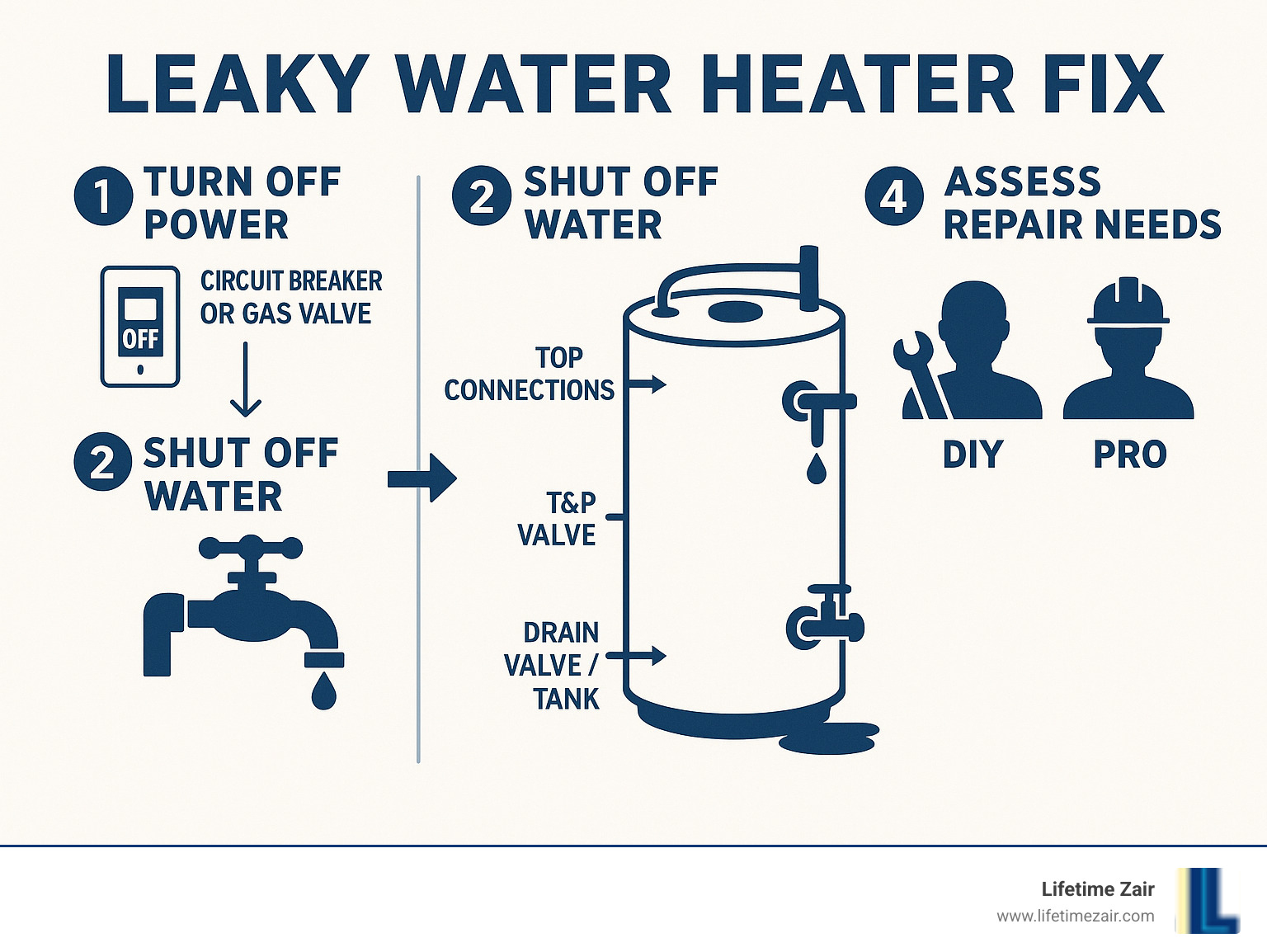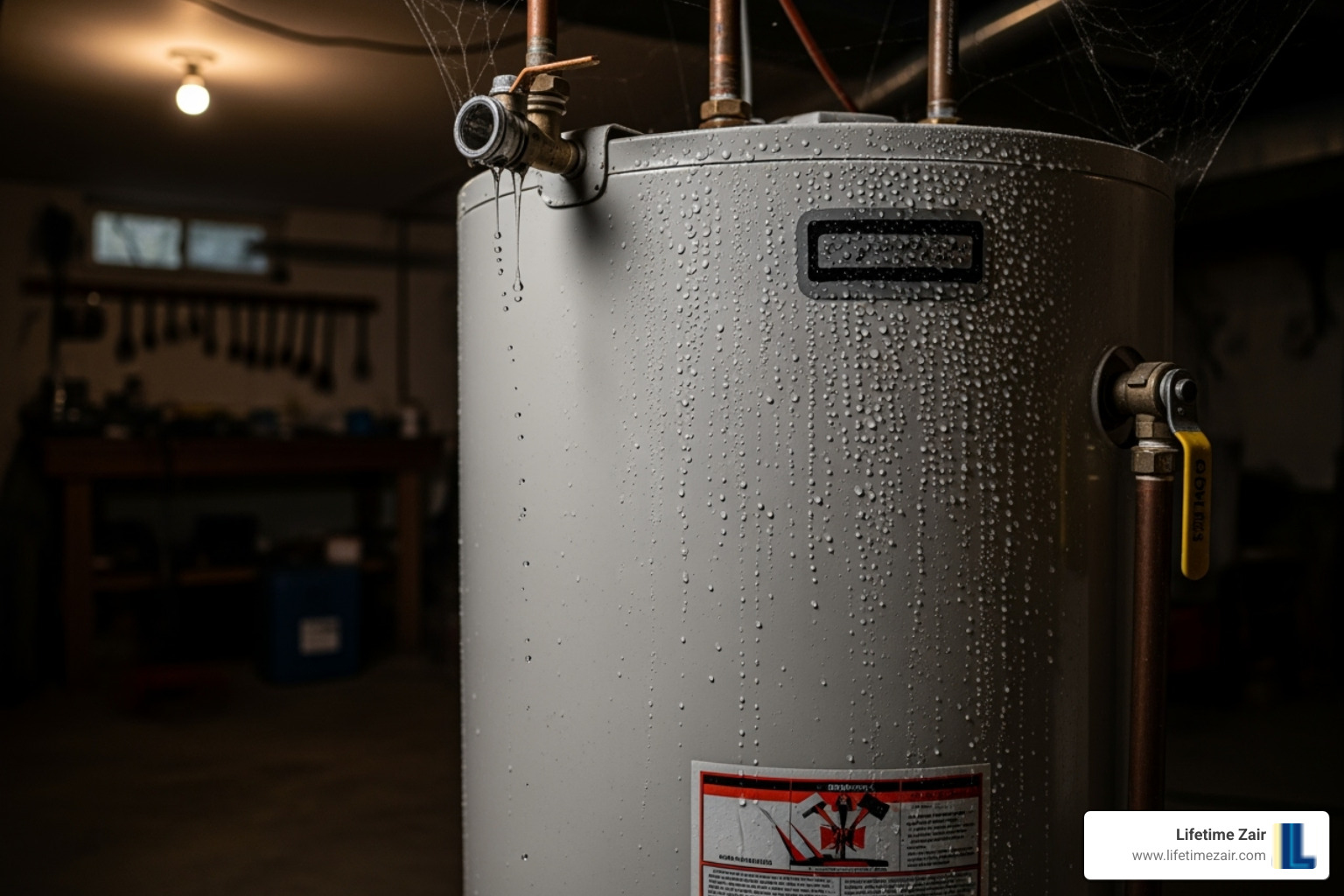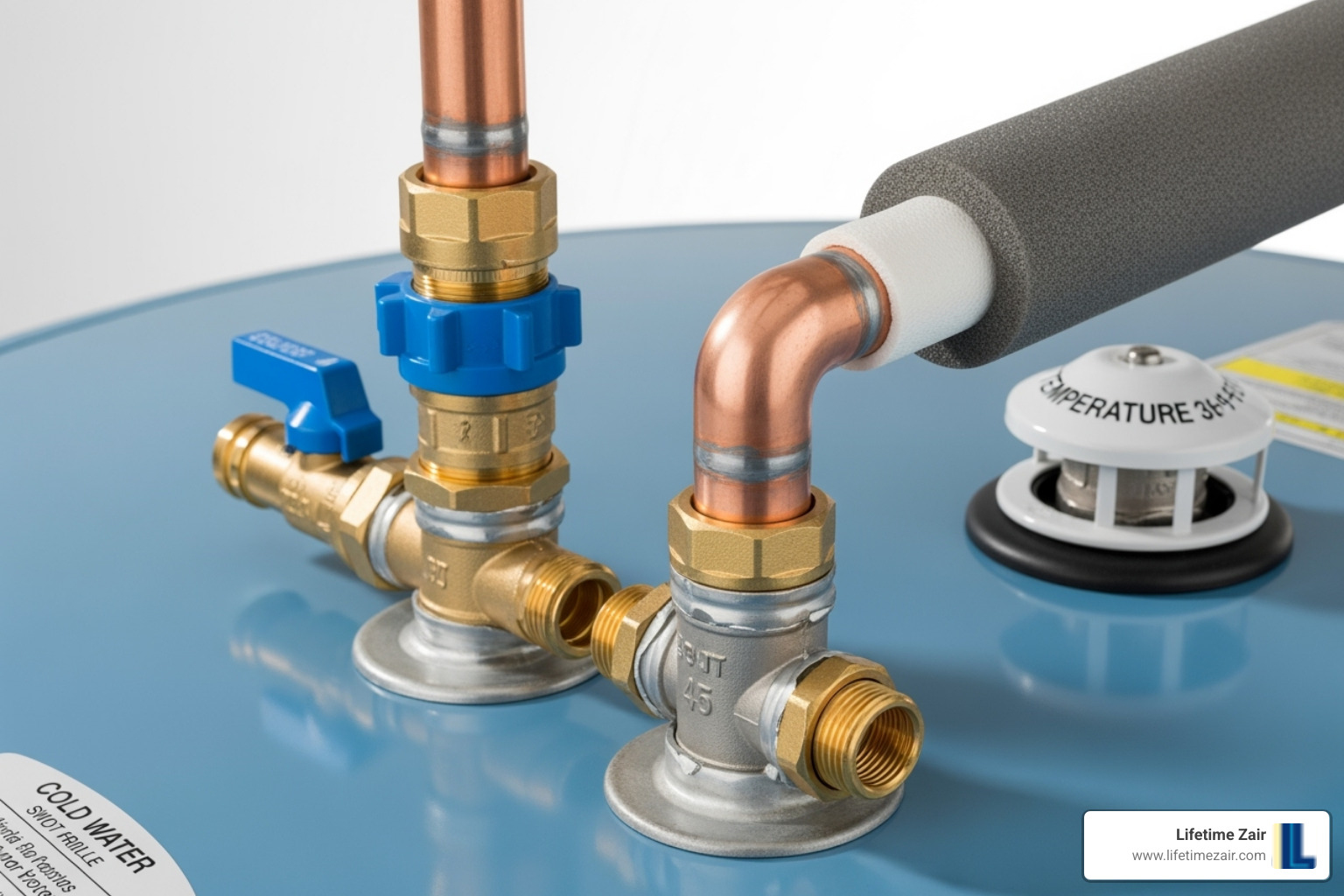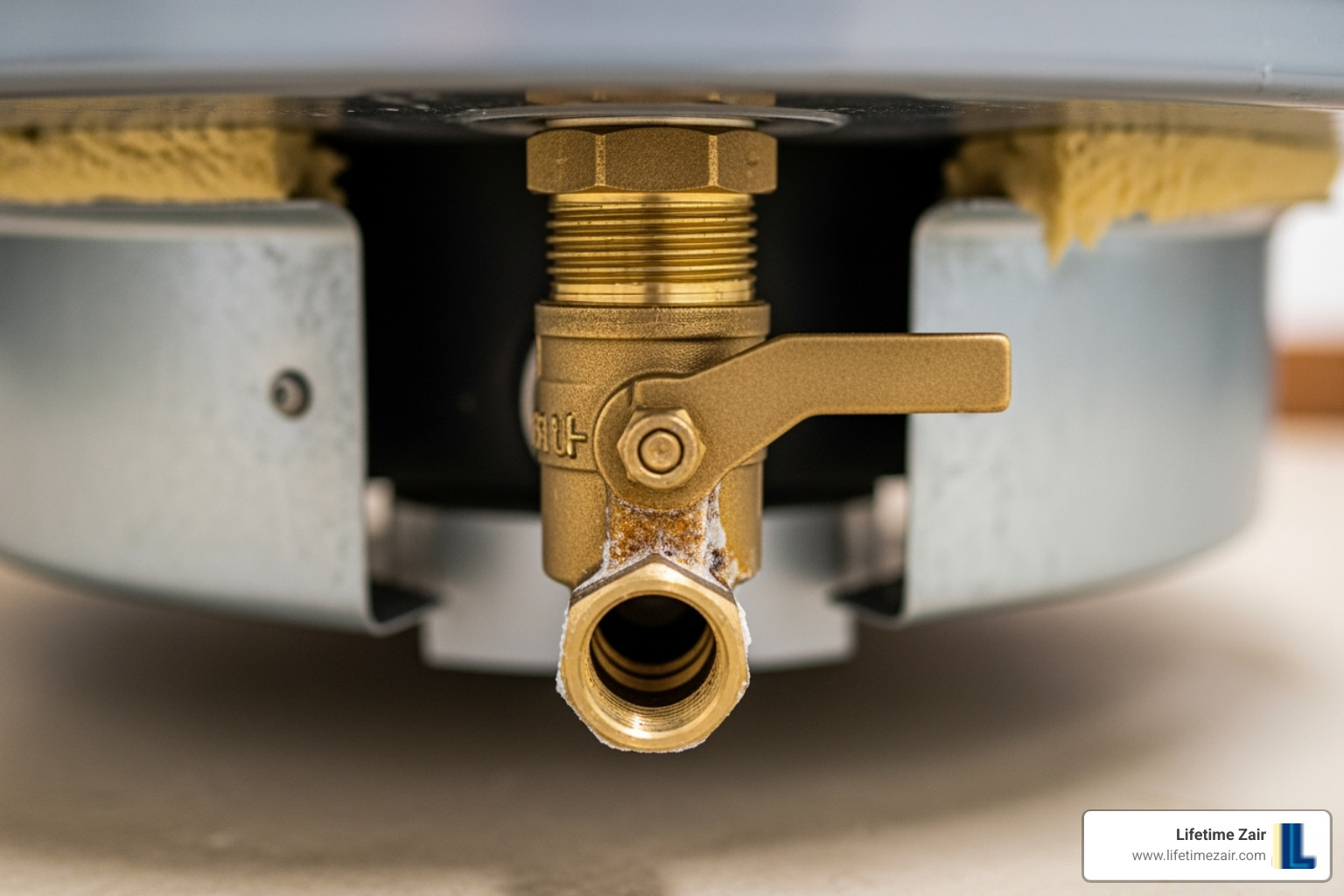Why Acting Fast on Water Heater Leaks Saves You Money
Leaky water heater fix solutions range from simple DIY repairs to full professional replacements, depending on the leak’s source and severity.
Quick Fix Guide:
- Turn off power – Circuit breaker for electric, gas valve for gas units
- Shut off water – Cold water inlet valve to the heater
- Find the source – Top (loose pipes), side (T&P valve), or bottom (drain valve/tank)
- Simple fixes – Tighten loose fittings, replace drain valve cap
- Call a pro – Tank leaks, gas smells, or major repairs
Finding a puddle around your water heater creates instant panic: Will this flood my house? How much will this cost?
The good news is that not all leaks spell disaster. Many are fixable with basic tools if you act quickly and know what you’re dealing with.
Water heater leaks contribute to the 10,000 gallons of water wasted in an average home annually. More importantly, a small leak today can become major water damage tomorrow if ignored.
Some leaks are simple fixes, like tightening a fitting, while others, like tank corrosion, mean it’s time for a replacement. The trick is knowing the difference and acting fast.
First Steps: What to Do When You Find a Leak
Finding water around your water heater requires immediate attention. Safety comes first, followed by preventing further water damage. Water and electricity are a dangerous mix, and gas heaters pose a risk of gas leaks. Before investigating, make the area safe. For a deeper dive into what might be causing your troubles, check out more info about prevalent water heater problems.
Turn Off the Power and Water Supply
This step is mandatory for safety. Before attempting a leaky water heater fix, you must cut off both the energy and water supply.
For electric water heaters, go to your electrical panel and flip the water heater’s circuit breaker to “Off.” This prevents the risk of electrocution.
For gas water heaters, find the gas shutoff valve on the line leading to the unit and turn it so it’s perpendicular to the pipe. If you can’t, turn the temperature dial on the unit to “pilot.”
Next, shut off the water. Turn the cold water inlet valve (usually on top) clockwise until it stops. This prevents more water from entering the tank.
For a serious leak, if you can’t find the heater’s valve, shut off the main water shutoff for the house. It’s a temporary inconvenience that prevents flood damage.
Is It a Leak or Just Condensation?
Before assuming you need a major leaky water heater fix, rule out condensation, which is often mistaken for a leak.
Start by wiping the water heater tank completely dry, then wait and observe.
Condensation forms when humid air meets the cool tank, especially after heavy hot water use or in humid areas like basements. If moisture reappears evenly over the tank surface, it’s likely condensation.
However, if water drips steadily from one specific spot or creates a growing puddle, you have an actual leak.
Also, rule out other appliances. A nearby HVAC system, air conditioner, or furnace could have a leaking condensation line that pools near the water heater.
Your Step-by-Step Leaky Water Heater Fix Guide
With the power and water off, it’s time to find the source of the leak to diagnose the problem. A pipe wrench and Teflon tape can handle many simple repairs, but a loose fitting requires a different fix than a corroded tank. The leak’s location points to the cause and the correct leaky water heater fix. If you’re noticing other issues beyond just the leak, our guide on Signs You Need a Water Heater Repair can help.
Leaks From the Top: Check Your Connections
Water on top of the heater usually means connection issues, which are often the easiest fixes.
The cold water inlet and hot water outlet pipes on top can loosen over time due to temperature changes. Examine these loose fittings for water droplets or mineral deposits. For a leaky water heater fix, gently tighten the fitting with a pipe wrench. Be careful not to over-tighten, as this can crack pipes or strip threads.
If tightening doesn’t work, the fitting, which may be a dielectric union used to prevent corrosion, might need new plumber’s tape or replacement. Dielectric fittings are essential for preventing galvanic corrosion but can still leak over time.
Leaks From the Side: The T&P Valve
The Temperature and Pressure Relief (T&P) Valve on the side is a crucial safety device. Water leaking from this valve or its overflow pipe indicates a problem.
This can be caused by high pressure (above 80 psi) in your home’s water system or high temperature. According to the Department of Energy, your water heater should be set to 120°F for safety and efficiency. If pressure and temperature are normal, you may have a faulty valve that needs replacement due to age or corrosion.
This leaky water heater fix involves draining the tank and replacing the valve. Since using the wrong specifications is dangerous, call a professional if you’re unsure.
Leaks From the Bottom: Drain Valve vs. Tank Failure
Bottom leaks are alarming, but many have simple solutions.
The drain valve is a common leak source, often because debris prevents a proper seal. First, try tightening the valve. If that fails, open it briefly to flush out sediment buildup. A garden hose cap can serve as a temporary fix for a persistent drip. If you hear unusual noises, it could be related to sediment, as discussed in our guide on Resolving Water Heater Noises in Carrollton.
If water seeps from the tank walls, it’s likely tank corrosion, meaning the heater has reached the end of its life. Signs include rust on the tank, rusty hot water, or a puddle not coming from a fitting. This is usually caused by anode rod failure. This sacrificial rod protects the tank and needs replacement every 3-5 years. Once it’s gone, the tank corrodes.
Unfortunately, a failed tank cannot be repaired. This is not a DIY leaky water heater fix; it’s time to call the professionals for a replacement.
DIY vs. Calling a Professional: Know Your Limits
While DIY projects can be satisfying, a leaky water heater fix requires knowing when to call a professional. Water heaters involve water, electricity, and sometimes gas, making some repairs dangerous. DIY risks include leaking gas lines, shock from electrical wiring, or improper soldering. Many areas also have strict building codes. While some fixes are DIY-friendly, professional expertise ensures safety, code compliance, and the experience to spot hidden problems.
A DIY Leaky Water Heater Fix: When Is It Safe?
Several common leaks are safe to fix yourself. These simple tasks don’t require specialized training and are manageable if you have the right tools and confidence.
- Tightening fittings: A loose connection on top of the tank often just needs a gentle turn with a pipe wrench.
- Replacing a drain valve: If the bottom drain valve is leaking, it’s often a straightforward swap, requiring you to drain some water from the tank first.
Your confidence level is key. If you’re comfortable with basic plumbing, you can likely handle these repairs. If not, it’s best to call for help. Using the proper tools, like a pipe wrench and plumber’s tape, is essential for a safe and effective fix.
When to Call a Professional Plumber
Some situations clearly require a professional; attempting a DIY fix can lead to disaster.
- The tank is leaking: If the tank itself is leaking from its metal walls, it needs to be replaced by a pro. This involves permits and code compliance.
- You smell gas: A gas smell is an immediate emergency. Leave the house, call your gas company from a safe distance, and then call a professional plumber.
- Major electrical work: Anything beyond flipping a circuit breaker, like wiring or replacing heating elements, should be left to a licensed professional.
- Soldering is required: Working with a torch and copper pipes requires skill and experience to avoid damage or fire.
- Complex issues: If a T&P valve keeps failing, a pro can diagnose deeper problems with your water pressure system.
Sometimes, the best reason to call a pro is for peace of mind. If you’re unsure, the cost of a service call is worth it. For complex issues that need professional attention, see our guide on Why is My Water Heater Not Heating Water?.
Preventing Future Leaks: Water Heater Maintenance 101
Like a car, your water heater needs regular maintenance to prevent unexpected breakdowns. After a leaky water heater fix, you’ll want to know how to prevent future issues. Most problems are preventable with annual attention. While water heaters typically last 8-12 years, proper maintenance can extend their lifespan.
Key factors to monitor include:
- Sediment buildup: Minerals from water accumulate in the tank, forcing the heater to work harder and potentially causing leaks.
- Anode rod: This sacrificial rod corrodes to protect the tank. It must be inspected and replaced every 3-5 years to prevent tank rust.
- Water pressure: Consistently high pressure (above 80 psi) stresses components, leading to premature failure and leaks.
For comprehensive guidance on water heater care, check out Hot Water is a Blessing, So Take Care of Your Water Heater Before It’s Too Late.
Annual Water Heater Maintenance Tasks
Here is your yearly water heater health checkup:
- Test the T&P valve: Annually, place a bucket under the discharge pipe and briefly lift the lever. Hot water should flow out and stop completely when you release it. If it drips or doesn’t flow, the valve needs replacement.
- Flush the tank: To remove sediment, connect a hose to the drain valve, turn off the cold water supply, open a hot water faucet, then open the drain valve. Let it run until the water is clear.
- Inspect the anode rod: Every 3-5 years, check the anode rod. This often requires a professional. If the rod is just a thin wire or is gone, it needs replacement.
- Check for leaks: Regularly look around the base and top connections for any moisture or rust spots. Catching problems early prevents a major leaky water heater fix later.
- Verify the temperature setting: Ensure your heater is set to a safe and efficient 120°F. Higher temperatures stress the system and increase scalding risks.
Frequently Asked Questions about Water Heater Leaks
Here are answers to common questions about leaky water heater fix scenarios.
Is a leaking water heater an emergency?
Yes, a leaking water heater can be an emergency. A rapid or steady leak poses a significant flooding risk and can cause extensive water damage. For electric heaters, pooling water creates an electrical hazard, while gas heaters present a potential gas leak risk. If you find a significant leak, immediately turn off the power (circuit breaker or gas valve) and turn off the water supply to the heater. If the leak is uncontrollable, it is an emergency. Call a professional right away.
How long will a water heater last after it starts leaking?
The lifespan depends on the leak’s source. If it’s from a replaceable component like a pipe fitting or valve, a simple leaky water heater fix can solve the problem, and the heater can continue for its full 8-12 year lifespan. However, if the leak is from the tank itself, it’s due to corrosion and cannot be repaired. The water heater has failed and needs immediate replacement to avoid a catastrophic flood.
Can I use my water heater if it has a small leak?
We strongly advise against using a water heater with any leak. It is not recommended for several reasons:
- Small leaks worsen: A tiny drip can quickly become a major flood.
- Inefficiency: The heater works harder to heat escaping water, leading to higher utility bills.
- Safety risk: Moisture near electrical or gas components is a serious hazard.
Until a proper leaky water heater fix is completed, it’s safest to turn off the unit. For immediate help, please Call Us for Water Heater Repair.
Stop the Leak for Good with Professional Help
A leaky water heater fix can be stressful, but with the right knowledge, you can handle it. This guide has covered crucial safety steps, how to diagnose the source of the leak, and which repairs are safe for DIY. We’ve also highlighted when to call a professional—for tank failures, gas lines, or electrical work—and how prevention through annual maintenance is your best defense.
The bottom line: ignoring even a small leak is never worth the risk. It can lead to floods, high utility bills, and serious safety hazards.
At Lifetime Zair, we get it. A leaking water heater is urgent. That’s why we’re here to help homeowners across North Texas tackle these issues head-on. Whether you’re in Carrollton, Plano, Frisco, or any of the communities we serve throughout the Dallas area, we understand that home comfort can’t wait.
Our team brings the expertise and tools needed to diagnose problems quickly and fix them right the first time. We also offer financing options and promotions because we believe essential home services should be accessible when you need them most.
Don’t let a small drip become a big disaster. For expert water heater repair service in Carrollton, TX, contact us today! We’re ready to help you stop that leak for good and get your home’s hot water flowing safely again.








